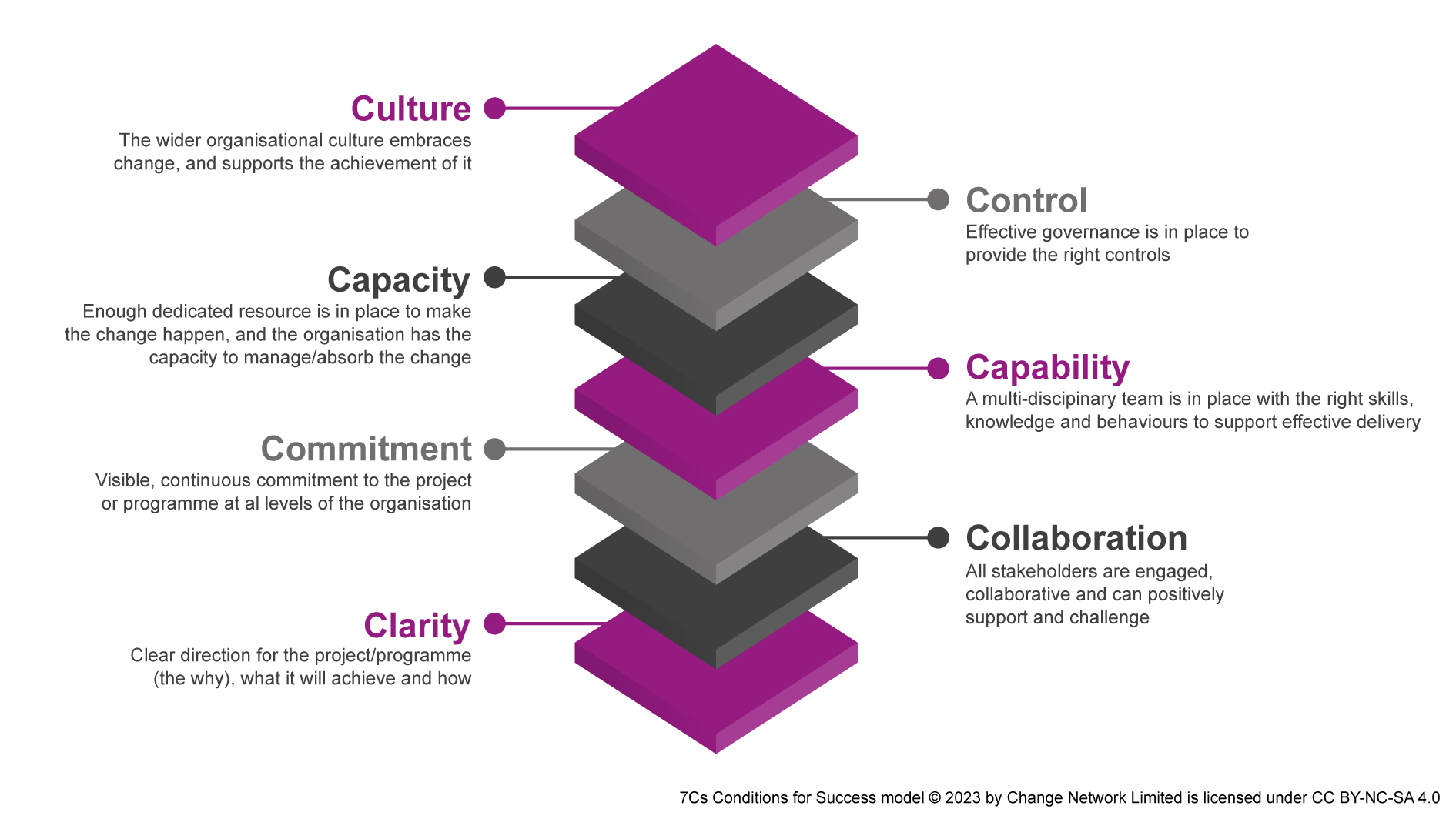Our Transformation Capability Framework looks to establish what works well and ‘what good looks like’ in relation to transformation activity across different types of council.
Background
This Transformation Capability Framework has been created with councils, for councils. It sets out ‘what good looks like’ to enable councils of all sizes and types to identify and address the capabilities that they need to have in place to deliver sustainable and effective transformation.
Terminology
As far as possible, this framework tries to avoid the use of specialist terminology. By necessity, some of the specialist areas of capability (for example data engineering and ICT), do include the use of some specialist terms. Where specialist terms have been used, links to wider reference materials are provided for context.
Feedback
Please email us at [email protected] to provide us with your feedback or suggestions for changes and additions to this framework.
How to use the Framework
Anyone can use this framework to:
- learn about the essential capabilities needed to deliver transformation in local government
- understand the skills, knowledge and behaviours needed depending on the type of transformation being delivered.
Transformation professionals can use this framework to:
- identify and test that they have the right capabilities in place to support planned transformation programmes and projects
- assess their current capability levels to support employee development and to ensure effective resourcing.
Senior leaders in local government can use this framework to:
- identify capability gaps in their teams and enable decisions to be made about resourcing and development
- forecast their organisation workforce needs, to make sure they have the right skills, knowledge, and behaviours in place to achieve their aims.
Hiring managers in local government can use this framework to:
- create effective and consistent role descriptions
- assess the suitability of candidates for transformation related roles.
Capability groupings
The capabilities in the framework have been grouped into two categories:
- Essential: Capabilities needed for all types of transformation.
- Specialist: Capabilities needed, in addition to Essential capabilities, for specific transformation types.
For ease of use, each capability has also been grouped based on functional areas of expertise such as ‘data’, ‘governance and control’ and ‘change management’.
For each functional area, a set of capabilities are set out for the overall function and then each defined in more detail. The functional areas are not intended to represent council services, and each should be read in conjunction with the Essential capabilities and not in isolation.
We recognise that councils do not use standard terminology for job roles. For example, a Business Analyst or Service Designer in one council might do a different job to the same named role in another, so we have also aligned ‘similar roles’ to each of the capabilities for this reason.
Skills, knowledge, and behaviours
Each capability has a defined set of Skills, Knowledge and Behaviours associated with it. These are considered the essential ingredients to enable the capability to be delivered.
Benchmarking the capabilities
For each functional area of capability, a basic ‘maturity index’ benchmarking tool has been developed using a scale of 1 to 5 to help councils to understand their overall maturity in that capability area.
Transformation capabilities
There are ten strategic transformation capabilities. Four are essential for all types of transformation and six are specific to the type of transformation being undertaken.
Essential:
Specialist:
- Finance
- Service design
- Business analysis
- Digital and technology
- Procurement and commissioning
- Organisational HR change
A new Transformation Capability Framework for councillors outlining the key skills and knowledge to ensure effective leadership and scrutiny of transformation within local authorities will be developed as part of our 2024/25 support offer.
If you would like to be involved, please email us at [email protected]
Essentials for successful transformation
Transformation can be challenging and not all transformation projects and programmes achieve their intended outcomes. The guidance below is designed to be read alongside the Transformation Capability Framework to help councils maximise the conditions for successful transformation.
The 7Cs Conditions for Success model is free for any organisation to use and to be built upon for non-commercial purposes.
The model is designed to provide councils with a handy checklist for any type of change or transformation with the aim of ensuring all 7 conditions for success are in place before change gets underway – and that the conditions for success continue throughout. It can be applied to changes of any size or scale.
To meet the 7 Conditions for Success, councils need:
- Clarity: A clear vision of the intended end state, what the change is trying to achieve and why, reinforced regularly.
- Collaboration: To involve anyone impacted by the change, or who needs to contribute to delivering the change early, and keep them involved throughout.
- Commitment: To delivering the change, working effectively with stakeholders to overcome risks and issues.
- Capability: The right skills, knowledge and behaviours in place to deliver the change.
Capacity: Enough capacity in place to both deliver the change and to be able to absorb and manage it. - Control: Effective governance and escalation processes in place so that the change is well managed and given priority alongside other activities.
- Culture: The overall readiness for change to be maximised across the organisation, aligning the first 6cs and the organisations values, behaviours, strategy and communication to be effective.
The 7Cs is a model that is proven within and outside of the sector and designed to be a tool you can use to talk about your own internal readiness before projects start.
7Cs Conditions for Success: handy guide
We have created a handy downloadable guide as a checklist for councils to use as they assess their readiness for change and transformation.

